

The New York Times: Book Review Search Article. Flannery O'Connor: Gifts of Meaning & Mystery. Dallas Public Library - Dallas Book Festival. 12, William Faulkner. William Faulkner, ca. 1954.
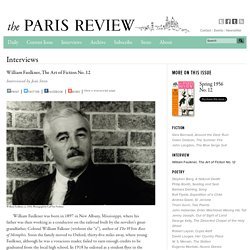
Photograph by Carl Van Vechten William Faulkner was born in 1897 in New Albany, Mississippi, where his father was then working as a conductor on the railroad built by the novelist’s great-grandfather, Colonel William Falkner (without the “u”), author of The White Rose of Memphis. Soon the family moved to Oxford, thirty-five miles away, where young Faulkner, although he was a voracious reader, failed to earn enough credits to be graduated from the local high school. In 1918 he enlisted as a student flyer in the Royal Canadian Air Force. ‘Shame and Wonder,’ by David Searcy. Photo “When people talk about style they are always a little astonished at the newness of it,” F.
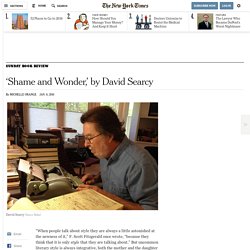
Scott Fitzgerald once wrote, “because they think that it is only style that they are talking about.” But uncommon literary style is always integrative, both the mother and the daughter of invention, wrought from a writer’s desperation “to express a new idea with such force that it will have the originality of the thought.” Astonishment is a quality central to David Searcy’s “Shame and Wonder,” a nonfiction collection from a writer best known for two horror-inflected novels, “Ordinary Horror” and “Last Things.” Essays: ‘Shame And Wonder,’ by David Searcy. Almost by definition, a book of essays is an odd duck — not quite memoir, which usually focuses on a particular (often harrowing) episode in a writer’s life; not quite nonfiction, which usually focuses on a historic event (dramatic or controversial), and is often book-length journalism.
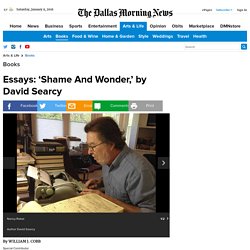
Essays tend to be occasional, thoughtful and philosophical: a form where a writer can navel-gaze and be introspective, unfettered by facts. Texas has an excellent tradition of the form: Larry McMurtry’s In a Narrow Grave is one of the best. In this tradition flows David Searcy’s Shame and Wonder, like a river of thoughts meandering through the prairies of the Lone Star State.
Cindyzzok added: Jorge Luis Borges - Jorge Luis Borges: The Mirror Man (1999) Directed by Philippe Molins Runtime: 47mins Language: English Although honors came late in life to Jorge Luis Borges, his unique worldview had begun to emerge even as a child.
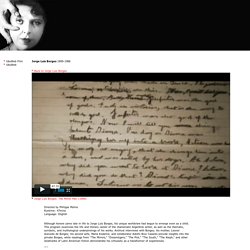
This program examines the life and literary career of the charismatic Argentine writer, as well as the thematic, symbolic, and mythological underpinnings of his works. Archival interviews with Borges; his mother, Leonor Acevedo de Borges; his second wife, Maria Kodama; and collaborator Adolfo Bioy Casares provide insights into the private Borges, while readings from “The Mirrors,” “Dreamtigers,” “The Plot,” “The South,” “The Aleph,” and other landmarks of Latin American fiction demonstrate his virtuosity as a transformer of experiences.
Cindyzzok added: Borges-Jorge-Luis_Craft-of-Verse_01-The-Riddle-of-Poetry. Michel Faber Plans to Stop Writing Novels. Photo “I wanted this to be the saddest thing I’d ever written,” the writer Michel Faber said over coffee last month in Midtown Manhattan, looking tired and disoriented.
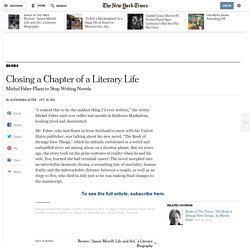
Mr. Joel Gardner/Interview — ragazine.cc. Thirty Years Later: A Conversation on John Gardner With John SmelcerContributing Editor This year marks the 30th commemoration of John Gardner’s tragic motorcycle accident.
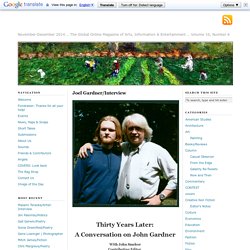
Shakespeare. David Foster Wallace. I am Andy Weir, author of "The Egg" and the forthcoming novel "The Martian." AMA! : sciencefiction. Kurt Vonnegut on Reading, Boredom, Belonging, and Hate. By Maria Popova “Hate, in the long run, is about as nourishing as cyanide.”

What makes the commencement address such a singular pinnacle of the communication arts is that, in an era where religion is increasingly being displaced by culture and secular thought, it offers a secular version of the sermon — a packet of guidance on how to be a good human being and lead a good life. It is also one of the few cultural contexts in which a patronizing attitude, in the original sense of the term, is not only acceptable but desired — after all, the very notion of the graduation speech calls for a patronly father figure or matronly mother figure to get up at the podium and impart to young people hard-earned, experience-tested wisdom on how to live well.
And implicit to that is an automatic disarmament of our otherwise unflinching culturally conditioned cynicism — which is also why the best commencement addresses are timeless and ageless and sing to us beyond the boundaries of our own life-stage. Halloween Costume Ideas From Famous Writers. Halloween is just around the corner.

Some people like this holiday because they can spend more time with their kids seeking candy, other part love this holiday for girls using the day as an excuse to dress like, hmm... cheeky girls. But every year we face the one huge common problem - where the hell I can find mind-blowing Halloween costumes or costume ideas? Writers Who Published Great Books Before Age 25. Picture it: teenage Mary Shelley was on a vacation getaway, with her husband Percy and some of his rambunctious poet friends, like that rogue Lord Byron… and out of the group of legends, it’s Shelley herself who arguably published the greatest work of all at the ridiculous age of 20: Frankenstein; or, The Modern Prometheus, a book that has penetrated our human consciousness.

In honor of Shelley’s birthday this month, here’s a list of 25 other writers who created heartbreakingly beautiful work before they could get a discount on a rental car or have their publishers demand an active Twitter account. If you’re 26, get on out of here. 130, Italo Calvino. Upon hearing of Italo Calvino’s death in September of 1985, John Updike commented, “Calvino was a genial as well as brilliant writer. He took fiction into new places where it had never been before, and back into the fabulous and ancient sources of narrative.” At that time Calvino was the preeminent Italian writer, the influence of his fantastic novels and stories reaching far beyond the Mediterranean. Two years before, The Paris Review had commissioned a Writers at Work interview with Calvino to be conducted by William Weaver, his longtime English translator.
Books By Bob White. Browse by Author (A) The Mystery of Charles Dickens by Joyce Carol Oates. Writers. Susan Sontag: Notes On "Camp" Published in 1964. Many things in the world have not been named; and many things, even if they have been named, have never been described. Raymond Carver. Raymond Clevie Carver, Jr.
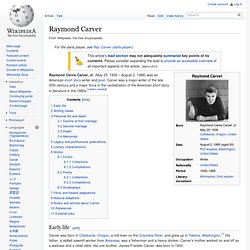
(May 25, 1938 – August 2, 1988) was an American short story writer and poet. Carver was a major writer of the late 20th century and a major force in the revitalization of the American short story in literature in the 1980s. [citation needed] Early life[edit] Carver was born in Clatskanie, Oregon, a mill town on the Columbia River, and grew up in Yakima, Washington.[1] His father, a skilled sawmill worker from Arkansas, was a fisherman and a heavy drinker. Jasper Fforde.com : Grand Central. Jack Kerouac’s List of 30 Beliefs and Techniques for Prose and Life. John Milton. John Ronald Reul Tolkien. Donna Tartt: "I've tried to write faster and I don't really enjoy it"
List of 21st-century writers. A[edit] B[edit] C[edit] D[edit] E[edit] F[edit]